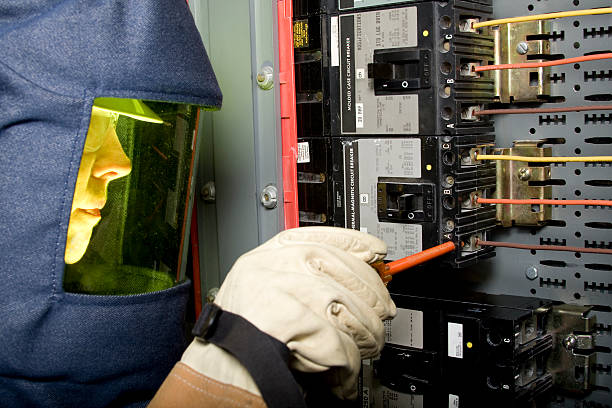Working with electricity comes with inherent dangers that can result in serious injuries or even fatalities. To ensure your safety, it is crucial to take necessary precautions, including wearing the appropriate Personal Protective Equipment (PPE) and following safe work practices. In this blog post, we will discuss the importance of PPE when working with electricity and provide guidelines for safe work practices. By adhering to these measures, you can minimize the risks associated with electrical work and prioritize your well-being.
When working with electricity, wearing the proper PPE is paramount to safeguarding yourself from electrical hazards. The following equipment should be used:
 1. Protective Gloves: Insulating gloves are designed to provide electrical insulation and protect against shock. Ensure that they are properly tested and meet the required safety standards. In addition to insulating gloves, there are also other protective gloves to provide protection against cuts, abrasions, or chemical exposures.
1. Protective Gloves: Insulating gloves are designed to provide electrical insulation and protect against shock. Ensure that they are properly tested and meet the required safety standards. In addition to insulating gloves, there are also other protective gloves to provide protection against cuts, abrasions, or chemical exposures.
2. Safety Footwear: Safety footwear, such as rubber boots or shoes with electrical insulation, helps protect workers from electrical shock when working on or near the ground where electrical currents may flow.
3. Face Shields and Safety Glasses: Face shields or safety glasses with side shields are essential for protecting the eyes and face from flying debris, arc flashes, sparks, or splashes that can occur during electrical work.
4. Non-Conductive Clothing: Wear clothing made from non-conductive materials, such as cotton, to prevent accidental contact with electrical circuits.
5. Hearing Protection: Depending on the work environment, electricity workers may need to wear hearing protection, such as earmuffs or earplugs, to reduce the risk of hearing damage from loud noises generated by electrical equipment or power tools.
It is essential to inspect and maintain your PPE regularly. Any equipment with defects affecting its insulating properties should be removed from service and sent for testing. Adhering to these PPE guidelines significantly reduces the risk of electrical accidents.
In addition to wearing the proper PPE, practicing safe work methods is crucial when working with electricity. Consider the following guidelines:
1. Grounded Tools: Always use tools that are properly grounded and insulated to prevent electrical shock. Inspect tools regularly to ensure they are in good working condition.
2. Never Work Alone: Avoid working alone when dealing with electricity. Having a colleague present can provide assistance in case of an emergency and serve as an additional safety precaution.
3. Follow Safety Instructions: Always adhere to safety instructions and guidelines provided by your employer. This includes undergoing proper training, understanding safety protocols, and following established procedures.
4. Visual Checks of Equipment: Perform visual checks on extension cables and flexible leads susceptible to damage. Inspect plugs, sockets, and connections to identify any signs of wear or damage before using portable equipment.
5. Proper Cable Connections: Use correct cable connectors or couplers to join lengths of cables together. Avoid using taped joints, as they can deteriorate and pose a safety risk.
6. Regular Electrical Inspections: Electrical installations should be installed and maintained by competent professionals. Ensure that electrical systems are checked regularly for any potential hazards or malfunctions.
7. Avoid Overloading Sockets: Do not overload socket outlets by using excessive adaptors or plugging in too many devices. This helps prevent overheating and reduces the risk of electrical fires.
Working with electricity requires a diligent focus on safety. By wearing the appropriate Personal Protective Equipment (PPE) and following safe work practices, you can significantly minimize the risks associated with electrical hazards. Remember to inspect and maintain your PPE regularly, use grounded tools, avoid working alone, and adhere to safety instructions from your employer. By prioritizing safety, you can ensure a secure working environment and protect yourself from potential electrical accidents. Stay vigilant, prioritize safety at all times, and promote a culture of electrical safety in your workplace.
Copyright © Hebei Sinotools Industrial Co.,Ltd. All Rights Reserved | Powered by  Sitemap
Sitemap